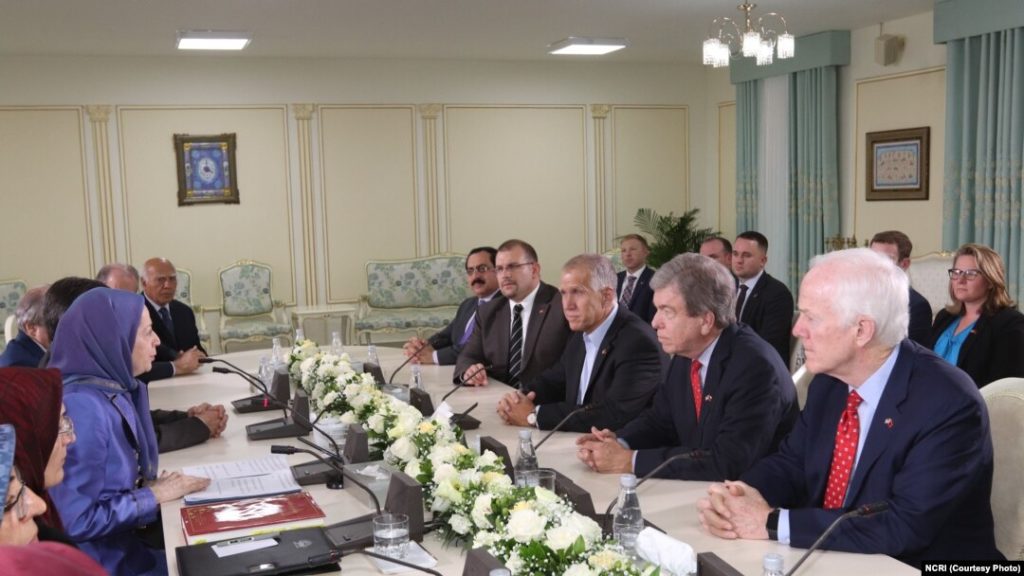Since the new US administration has taken the office, Joe Biden and his team are working closely with the EU leaders to open a door of cooperation on Iran’s nuclear deal.
In fact, every honest spectator agrees that the US and the EU have shown their cooperative feeling and attitude from the first day. Secretary Blinken affirmed several times the US desire to rejoin the Joint Comprehensive Plan of Action (JCPOA) meetings. In addition, the US declared that they are ready to reduce sanctions if Iran stops 20% uranium enrichment and stops using advanced IR2M centrifuges.
Despite the US and the EU goodwill on the JCPOA, the Iranian regime rejects any talks and negotiations. Mullahs repeatedly express that there will not be any negotiation about JCPOA until the US lifts all sanctions. Surprisingly, the Iranian regime and its supporters never mention that Iran is not acting under NPT anymore. Besides, the country has practically breached all its commitments under JCPOA which makes it meaningless for the US to remove any sanctions in the present situation.
Therefore, all observers agree that negotiators have reached a deadlock and it needs concessions from one side to pass the current situation.
In order to go further than concluding with the existence of a deadlock, it is necessary to answer the question whether returning to JCPOA like 2015 is possible or not? What are the EU and the US waiting for to take the next step on Iran?
First of all, returning to the 2015 deal is impossible. Outside Iran, four years of Trump administration with "America First" policy showed how much the international community depends on the US for a stable market, trade, security, etc. Brexit is finalized and Britain has no obligation to follow the EU's policy. The Abraham Accord concluded peace agreements between Israel and three Muslim countries. The international community is still struggling with the Coronavirus pandemic that has shaken our societies to their roots.
On the other hand, there is no intention inside Iran to stop or reduce the nuclear program. Moreover, the Iranian regime's missile program and the regime's regional destabilization activities continue. Supporting terrorist groups and providing arms for Houthis and other terrorist organizations remain as international concerns that JCPOA failed to control or motivate Iran to negotiate on.
An Iranian diplomat is sentenced to 20 years of prison for attemped terrorist murder against the opposition movement, the National Council of Resistance of Iran. The 2017 and 2019 uprisings totally destroyed Iranian regime legitimacy inside Iran when IRGC forces killed more than 1500 peaceful protesters. Shutting down the Ukrainian airliner with IRGC missiles and hiding the truth and withwashing the armed forces in finalized reports are just examples of the turbulent society in Iran.
Therefore, Iran, the US and the EU are not in the same situation as they were in 2015. According to the new balance, each side defines its requests.
Ali Khamenei, the supreme leader of the Iranian regime, declared that Iran returns to JCPOA if the US returns to all its commitments. Thus, returning to JCPOA as it was in 2015 is the goal of the Iranian regime, and they are well aware that they are not in a position to negotiate for more.
On the other hand, western powers declared that JCPOA is the minimum agreement and some issues such as the resumption of inspections, missile program, and the regional influence of the Iranian regime must be discussed in a broader and more durable agreement.
Although both sides have clearly stated their aims of negotiations and it is clear how far they are to get an agreement, the EU and the US are desperately seeking to return Iran to the negotiation table.
Firstly, the Iranian regime is in a weak position and the EU and the US can demand more than JCPOA. Secondly, the regime has dreadfully lost its domestic stand. Therefore, even more so than sanctions, the Iranian regime is afraid of nationwide uprisings and protests such as the ones in November 2019. The regime knows that if the people flow the streets once more, they can go on until they completely overthrow the mullahs.
Now, the question is how long do the EU and the US want to ride the dead horse of JCPOA, and what their alternative is?
The EU and the US have miscalculated the Iranian nuclear deal. They think reaching a deal is accessible, although it can take months or maybe years. The missing factor however is the people of Iran and their resistance.
Continuing endless negotiations when the deprived Iranians in many cities are struggling for basic needs is not the best approach. People are awaiting for a moment to outcry their outrage and it can be anything, the Iran-China treaty, the upcoming elections, or more economical pressure.
In any moment, any incident can spark new uprisings in Iran. Therefore, the EU and the US cannot put all their eggs in the JCPOA basket. On the other hand, a sustainable policy would be to support the people of Iran and their desire for a democratic change.
As it is expressed in the US congress resolution 118, with more than 180 bipartisan supporters, the world must support a secular democratic republic in Iran. Thus, bringing the Iranian regime to the negotiation table, without responding to their blackmailing policies cannot be a positive move.
The EU and the US must support the people of Iran by putting more focus on human rights violations and suppression, then they can achieve a reliable outcome on their negotiations with Iran.


